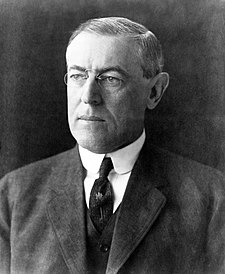O rebuliço da criação da Liga das Nações no Senado dos Estados Unidos em 1919.
"Wilson’s commitment to a world in which democracy could flourish was by itself revolutionary. Equally evolutionary was the second component of his vision—the belief that the key to creating that world lay in extending the reach of international law and building international institutions. The former college president—who ironically during his first term had enthusiastically used American military power to enforce the Roosevelt corollary to the Monroe Doctrine—called on the victorious powers to craft an international agreement that would provide “mutual guarantees of political independence and territorial integrity to great and small states alike.” He went to the Paris Peace Conference in December 1918 to push his idea on deeply skeptical European leaders.
"He was ultimately forced to compromise on many of the particulars of his plan. Nevertheless, in the end he prevailed on the core point. The Treaty of Versailles, signed in July 1919, established a League of Nations that would “respect and preserve as against external aggression the territorial integrity and existing political independence of all.” Wilson returned to the United States convinced that the idea of collective security—“one for all and all for one”—would prevent war and remake world politics. The idea of the League of Nations was also revolutionary for American politics. Wilson was asking Americans to do more than just cast away their aversion to entangling alliances. The United States, after all, had fought World War I as an “associated” power and not an “allied” one in deference to the traditional reluctance to become tied militarily to other countries. He was asking them to spearhead an international organization that would seek to protect the security of its members, however far they might be from American shores. That would prove the rub.
"The Senate’s rejection of the Treaty of Versailles is usually recounted as a triumph of traditional solationism. Isolationists certainly were the treaty’s most vociferous critics. The “irreconcilables” and “bitterenders,” as they were called, were led by Republican Senator William E. Borah of Idaho, a man who had a reputation as an expert on world affairs despite never having left American soil. The irreconcilables were traditional isolationists who vehemently opposed entangling the country in foreign alliances. Borah insisted that if he had his way the League of Nations would be “20,000 leagues under the sea” and he wanted “this treacherous and treasonable scheme” to be “buried in hell.” Even “if the Savior of men would revisit the earth and declare for a League of Nations,” he declared, “I would be opposed to it.”"
A rejeição do Senado à Liga é famosa entre os isolacionaistas. O então Senador William E. Borah e seus companheiros "irreconsiliáveis" se opuseram raivosamente ao tratado. Eles se opunham ao fato que Wilson queria empreender o mundo. Não queriam que os EUA atassem seu destino ao capricho e aos interesses alheios.
Com o fim da guerra, os Estados Unidos dominaram o mundo como ninguém havia dominado antes. As potências mundiais estavam destruídas. Tinha, de longe, as mais potentes força aérea e naval. Além do mistério do maior temor do mundo em suas mãos: a promessa da bomba atômica.
Ter o mundo ao pés da América, em forma de "Liga das Nações"? Hum... Talvez seja uma boa ideia.
A rejeição do Senado à Liga é famosa entre os isolacionaistas. O então Senador William E. Borah e seus companheiros "irreconsiliáveis" se opuseram raivosamente ao tratado. Eles se opunham ao fato que Wilson queria empreender o mundo. Não queriam que os EUA atassem seu destino ao capricho e aos interesses alheios.
“Are you willing to put your soldiers and your sailors at the disposition of other nations?”
Senador Republicano
Henry Cabot Lodge de Massachusetts
The victory of the anti-treaty forces heralded for a time the continuation of the policy of the free hand that Lodge and others so loved. By the beginning of the 1930s, however, this unilateral internationalism began giving way to rising isolationist sentiment. As the country entered the Great Depression and war clouds gathered on the European horizon, Americans increasingly retreated to Fortress America. Some isolationists argued that war would not occur. In July 1939 Senator Borah confidently predicted, “We are not going to have a war. Germany isn’t ready for it. I have my own sources of information.”
Com o fim da guerra, os Estados Unidos dominaram o mundo como ninguém havia dominado antes. As potências mundiais estavam destruídas. Tinha, de longe, as mais potentes força aérea e naval. Além do mistério do maior temor do mundo em suas mãos: a promessa da bomba atômica.
Ter o mundo ao pés da América, em forma de "Liga das Nações"? Hum... Talvez seja uma boa ideia.
Trechos extraídos de "America Unbound de Daalder & Lindsay, 2003, p. 6-7
(Fotos do então presidente dos Estados Unidos e do Senador, respectivamente)





0 comentários:
Postar um comentário